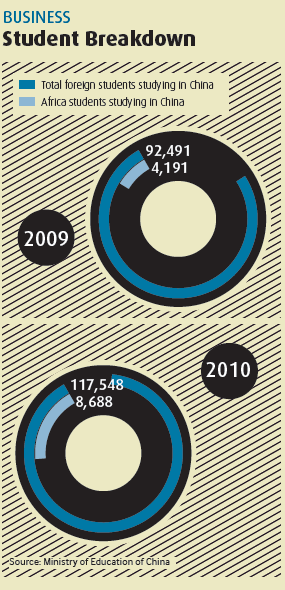|

Growing ties between China and African nations have led to a dramatic rise in the number of African students pursuing university degrees in China. But many of these students will never apply the skills they learned in Chinese classrooms in a Chinese workplace. Tebogo Lefifi, Executive Chairperson of Young African Professionals and Students (YAPS), maintains the YAPS network of over 1,500 young Africans living and studying in China, but says that the majority of these young people will not pursue careers in China.
This is, however, not due to a lack of interest. Many students attending a YAPS CV workshop on December 9, 2012, said that they hoped to work in China after graduation, but were not optimistic about their employment prospects, citing China's competitive job market as a major obstacle. Lefifi, who helped found YAPS in 2009, estimates that fewer than 10 percent of African graduates from Chinese universities work in China after graduation. She added visa requirements to the list of difficulties that graduates face. Student visas expire a month after graduation, and citizens from many African countries are required to return home to apply for a new visa. High travel costs and visa fees are often too expensive for fresh graduates to pay on their own, and many Chinese companies are not willing to cover these expenses for locally-trained employees. "We need this market to be more open to us," said Anthony Lenaiyara, a senior studying electrical engineering at Beijing University of Aeronautics and Astronautics.
Lenaiyara, whose education has been funded by a scholarship from the China Scholarship Council, pointed out that for some of his peers, visa and job market questions are irrelevant. Scholarships aimed at boosting Africa's development offer students a free university education in exchange for the promise that they will return to Africa after graduation to use their new skills in their home countries.
But many students are reluctance to return home after graduation. Some fear that having studied in China means that they lack the connections that African-educated graduates enjoy in Africa. Lenaiyara is personally concerned about his ability to compete on the African job market. He said that many African companies are not impressed by Chinese degrees, and that returning graduates must do additional work, including unpaid internships and seeking formal certification, to get credentials that will be recognized by African employers. Tebogo Lefifi agreed that African companies and governments often have yet to understand the value of graduates' experience in China. But she said that studying in China is a major advantage for entrepreneurs, graduates working for family businesses and those that find jobs with Chinese companies that operate in Africa.
Lefifi pushes YAPS members to compensate for any difficulties they may face on the job market by recognizing and publicizing their unique skills, such as language ability and familiarity with Chinese culture. She commented, "Most graduates don't realize that having studied in China is an asset." Lenaiyara added that teaching students to sell their skills is important, saying, "We find a lot of students who are not able to write their own CVs or market themselves."
But some YAPS alumni have neatly sidestepped these issues by founding their own businesses. Danilo Armando and Coana Sebastiao, who studied economics and architecture respectively, both left Mozambique to attend university in Beijing. After graduating, they returned to Mozambique and founded DDS Commercial, a company that specializes in heavy machinery. After building a solid foundation in Africa, the duo are now preparing to expand their business to China. Affiliated with YAPS from the beginning, they now attend events to recruit new talent for their company. This is good news for students like Lenaiyara, who hope that African entrepreneurs in China will provide more employment opportunities for Africans with Chinese degrees. |